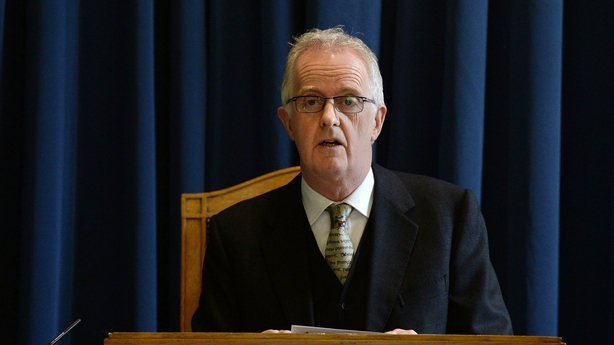As the Disclosures Tribunal says it is to prioritise the O'Higgins investigations, full clarity on the state of knowledge of the Department and Frances Fitzgerald on the O'Higgins investigations may not be known for several months yet, writes RTÉ's Sandra Hurley.
Events at Dublin Castle were already destined to be explosive in the early new year as the Disclosures Tribunal moved to the heart of its investigation of an alleged senior Garda smear campaign against Sgt Maurice McCabe.
Now, its work has an added political significance as it is being held up as the proper forum to determine the future of an under siege minister.
Initially the tribunal, chaired by Supreme Court judge Peter Charleton, was an inquiry the government had to be pushed into.
It was to have been another behind closed doors exercise, but Sgt McCabe and his legal team strongly objected, insisting only a full tribunal with transparent, public hearings would suffice.
Now, the Taoiseach and Fine Gael ministers are at pains to stress the importance of allowing the Disclosures Tribunal the space to do its work.
This also provides some much needed political cover for the current controversy involving Frances Fitzgerald.
And while unravelling whether senior gardaí orchestrated a campaign to do down a Garda highlighting malpractice within the force remains the inquiry's primary objective, it now has an added role in examining any connection between the Tánaiste and a legal strategy to attack Sgt McCabe.
This was confirmed when the Tribunal issued its update last Friday lunchtime revealing that its next hearings would focus on the Garda Commissioner's legal strategy at the O'Higgins Commission.
This was always a key part of the inquiry's work as set out in its terms of reference.

The confirmed date for the next hearings on 8 January, was not revelatory as it had been circulated a week ago with legal parties told to prepare for then.
However, what surprised many close to the Tribunal, was that the inquiry's next phase had been expected to examine the allegations made by former Garda press officer Dave Taylor in a protected disclosure.
He has alleged that he was directed to smear Sgt McCabe to journalists.
Instead, the Tribunal will prioritise the O'Higgins investigations.
And as part of this work, it will take in the controversial email forwarded on to Ms Fitzgerald which is at the epicentre of the threat of a snap election.
This may involve calling the minister and other Department of Justice officials to give evidence about what they knew or did not know about a strategy to attack Sgt McCabe's motivation, and whether they could or should have done anything about it.
Questions will likely also be asked about why a key email of interest to the Tribunal had not already been handed over.
As far back as February, Mr Justice Charleton had made a public call for such co-operation in his opening statement within days of the inquiry's establishment.
The Taoiseach has now ordered the Department to trawl through its documents to see if there is anything else which should be sent to the inquiry.
Fine Gael sources have been briefing political correspondents all weekend of the importance of Friday's statement from the Tribunal and the clarity that January's hearings will provide as to Frances Fitzgerald's approach.
One problem though; While the sittings will allow the teasing out of all of this in detail, and crucially in public, Mr Justice Charleton is unlikely to issue his final word on events for several months.
That is because the remaining sections of the inquiry's work are all interlinked.
A conservative estimate would be two months for hearing evidence and another two months for the issuing of a report which will also have to take in the creation of the Tusla file on Sgt McCabe.
This all means there may not be full clarity on the state of knowledge of the Department and the Minister for several months yet.

